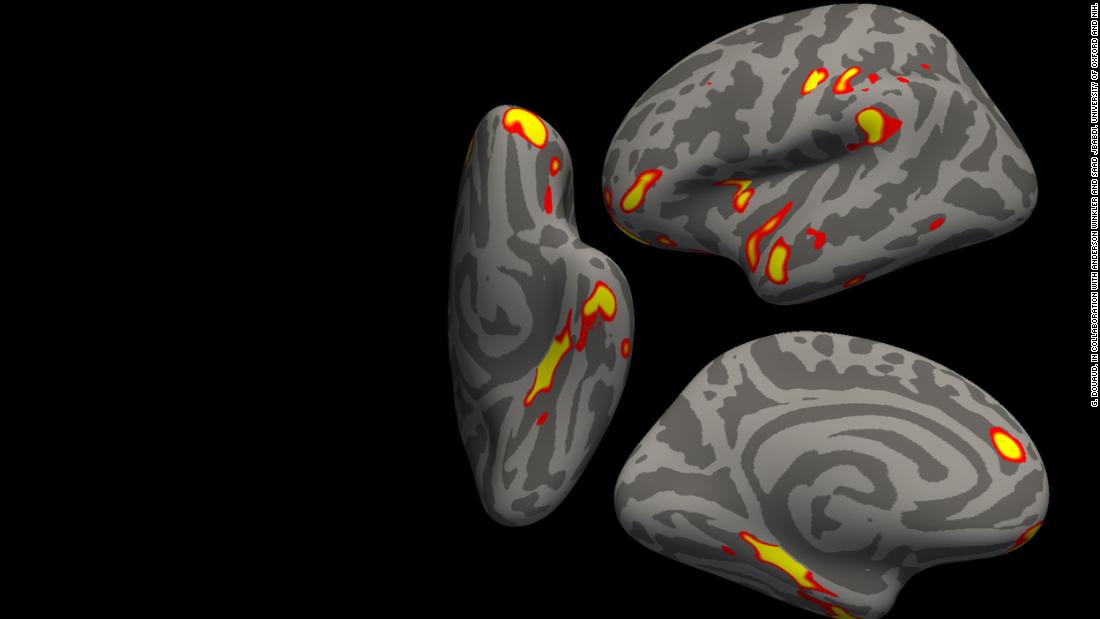Would covid-19 affect the brain?
Study indicates yes 2:30
(CNN) --
Patients with even a mild case of COVID-19 can experience accelerated brain aging and other changes, according to a new study.
The study, published Monday in the academic journal Nature, is considered the largest of its kind.
It found that the brains of those who had COVID-19 had greater gray matter loss and brain tissue abnormalities compared to those without the disease.
Many of these changes occurred in the area of the brain related to the sense of smell.
"We were quite surprised to see clear differences in the brain with even mild infection," lead study author Gwenaëlle Douaud, an associate professor of neuroscience at the University of Oxford, told CNN in an email.
Douaud and colleagues evaluated the brain images of 401 individuals who had COVID-19 between March 2020 and April 2021, both before infection and a mean of 4.5 months after infection.
They compared the results with brain imaging of 384 uninfected individuals similar in age, socioeconomic status, and risk factors such as blood pressure and obesity.
Of the 401 infected individuals, 15 patients had been hospitalized.
The 785 participants ranged in age from 51 to 81 and were part of the UK Biobank, a government health database of 500,000 British participants started in 2012.
What complications can covid-19 generate in the brain and nervous system?
A new study analyzes the cases of hospitalized patients
Douaud explained that it is normal for people to lose 0.2% to 0.3% of gray matter each year in areas of the brain related to memory as they age, but in the study's assessment, patients who had been infected by the coronavirus lost an additional 0.2% to 2% of tissue compared to those who had not been infected.
advertising
In addition to the images, the executive and cognitive function of the participants was also evaluated using the Trail Making Test, a tool used to help detect cognitive deficits associated with dementia and that tests the processing speed and brain function of a person.
The authors found that those with the greatest loss of brain tissue also performed the worst on this test.
Although the most affected areas of the brain seem to be related to the olfactory system, Douaud said it was not clear why this was the case.
"Since the abnormal changes we observed in the brains of infected participants could be related in part to their loss of smell, it is possible that their recovery will lead to these brain abnormalities becoming less marked over time. Similarly, it is likely that the deleterious effects of the virus (either direct or indirect through inflammatory or immune reactions) decline over time after infection. The best way to find out would be to re-scan these participants in a year or two," he said.
Douaud added that the researchers plan to resume imaging and testing the participants in a year or two.
OPINION |
These symptoms of covid-19 raise new questions
The greatest impact of brain changes
And while the study finds some link between infection and brain function, it's not yet clear why.
Previous studies have shown that people with significant and repeated loss of smell also have an associated loss of gray matter.
However, this study did not assess whether patients actually experienced loss of smell.
The authors cautioned that the findings were only from a point in time, but noted that they "raise the possibility that the long-term consequences of SARS-CoV-2 infection may contribute over time to Alzheimer's disease or other forms of dementia".
While the findings were remarkable, they weren't enough to cause alarm, said Dr. Richard Isaacson, a neurologist and director of the Center for Brain Health at Florida Atlantic University.
Isaacson was not involved in the study.
The doctor said the study findings were noteworthy to clinicians, but added that the overall impact on individuals was difficult to determine and could be small.
"It's really hard to know the long-term clinical impact and the impact on quality of life in a situation like this," he said.
Living with parosmia, a long covid disorder that distorts smells and tastes
"The brain can be affected by other mechanisms, such as immunological, inflammatory, vascular, or psychological/behavioral changes, but not by direct infection," said Dr. Alan Carson, a professor of neuropsychiatry at the Center for Clinical Brain Sciences at the University of Edinburgh, which was not involved in the study.
"What this study almost certainly shows is impact, in terms of neural changes," he said.
"But I don't think it helps us understand the mechanisms that underpin cognitive change after a COVID infection."
brainCovid-19






